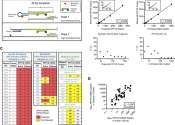Hitchhiking vaccines boost immunity
Many vaccines, including those for influenza, polio, and measles, consist of a killed or disabled version of a virus. However, for certain diseases, this type of vaccine is ineffective, or just too risky.
Feb 17, 2014
0
0








